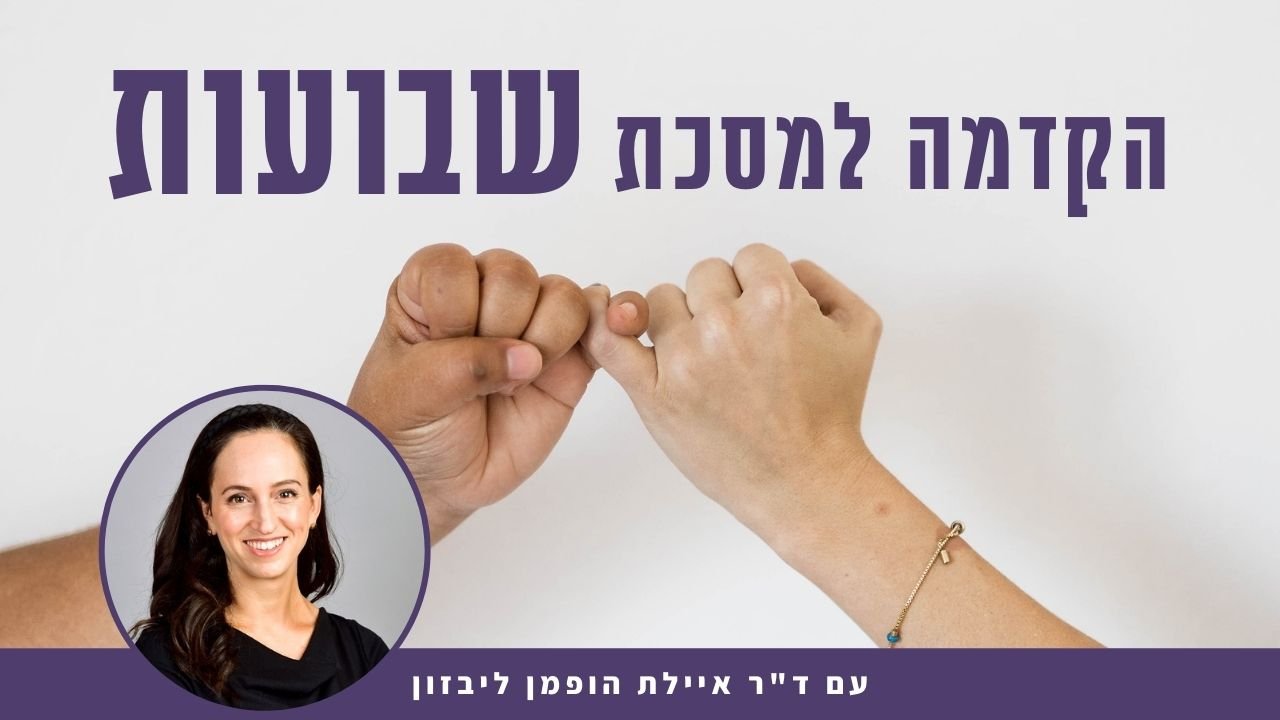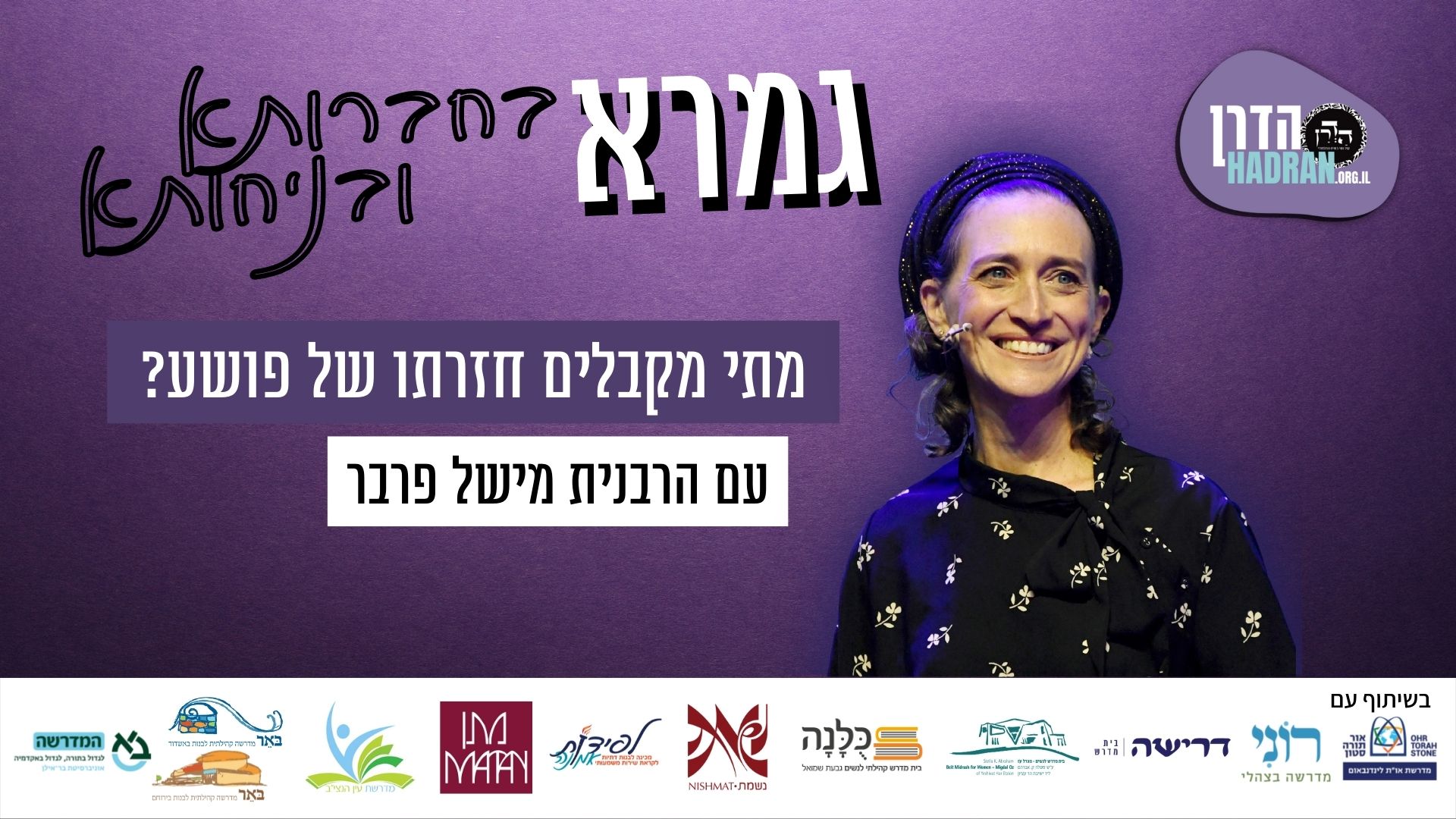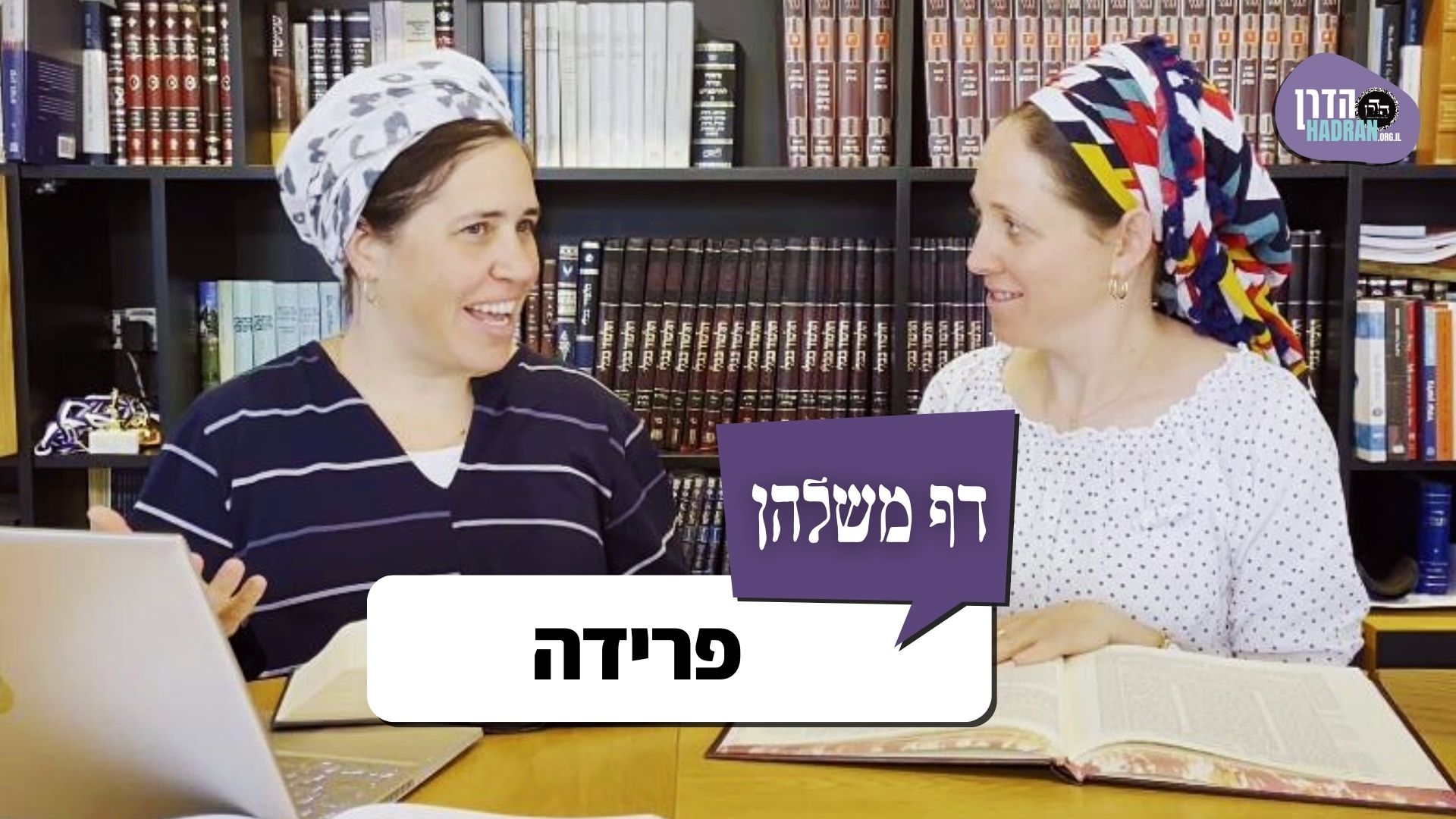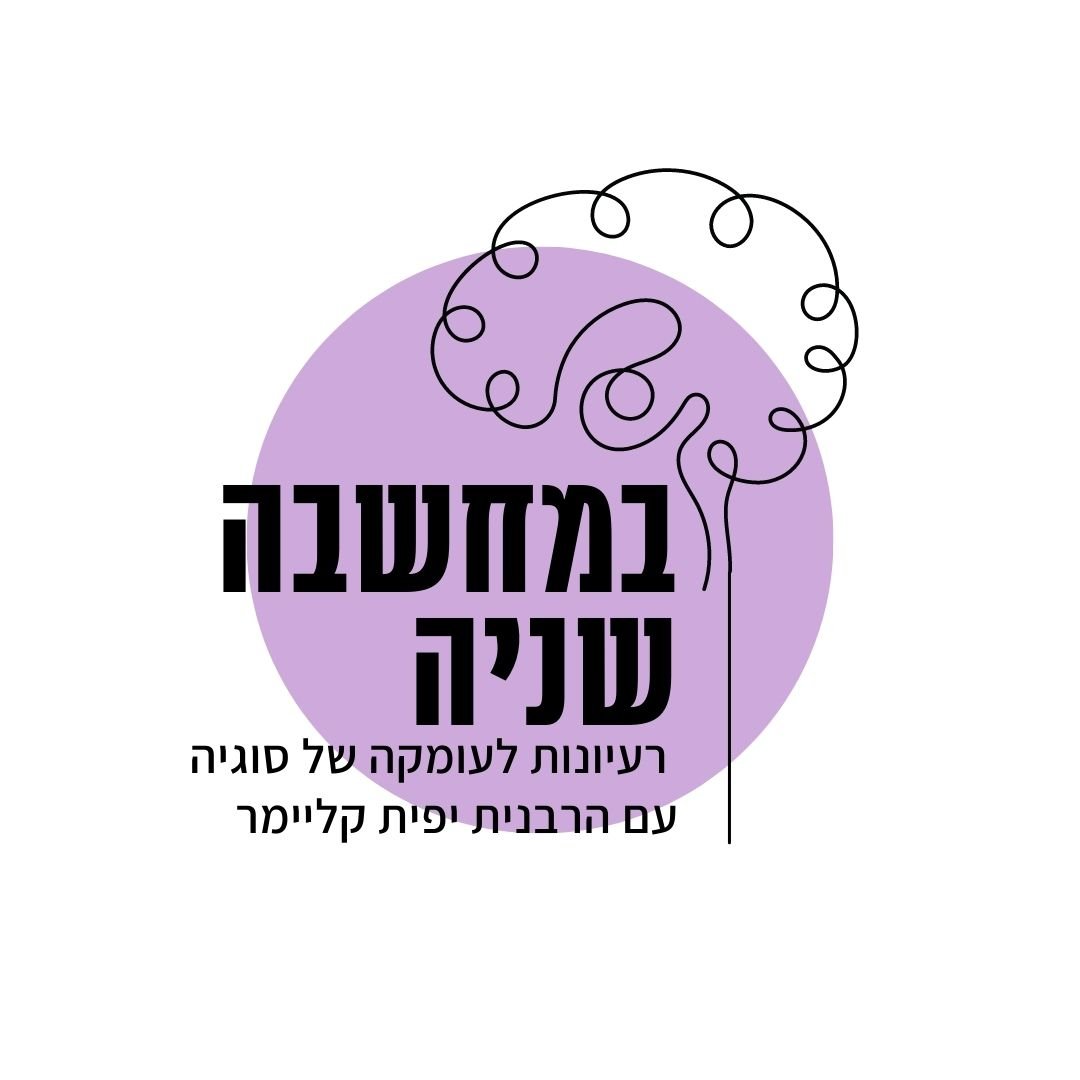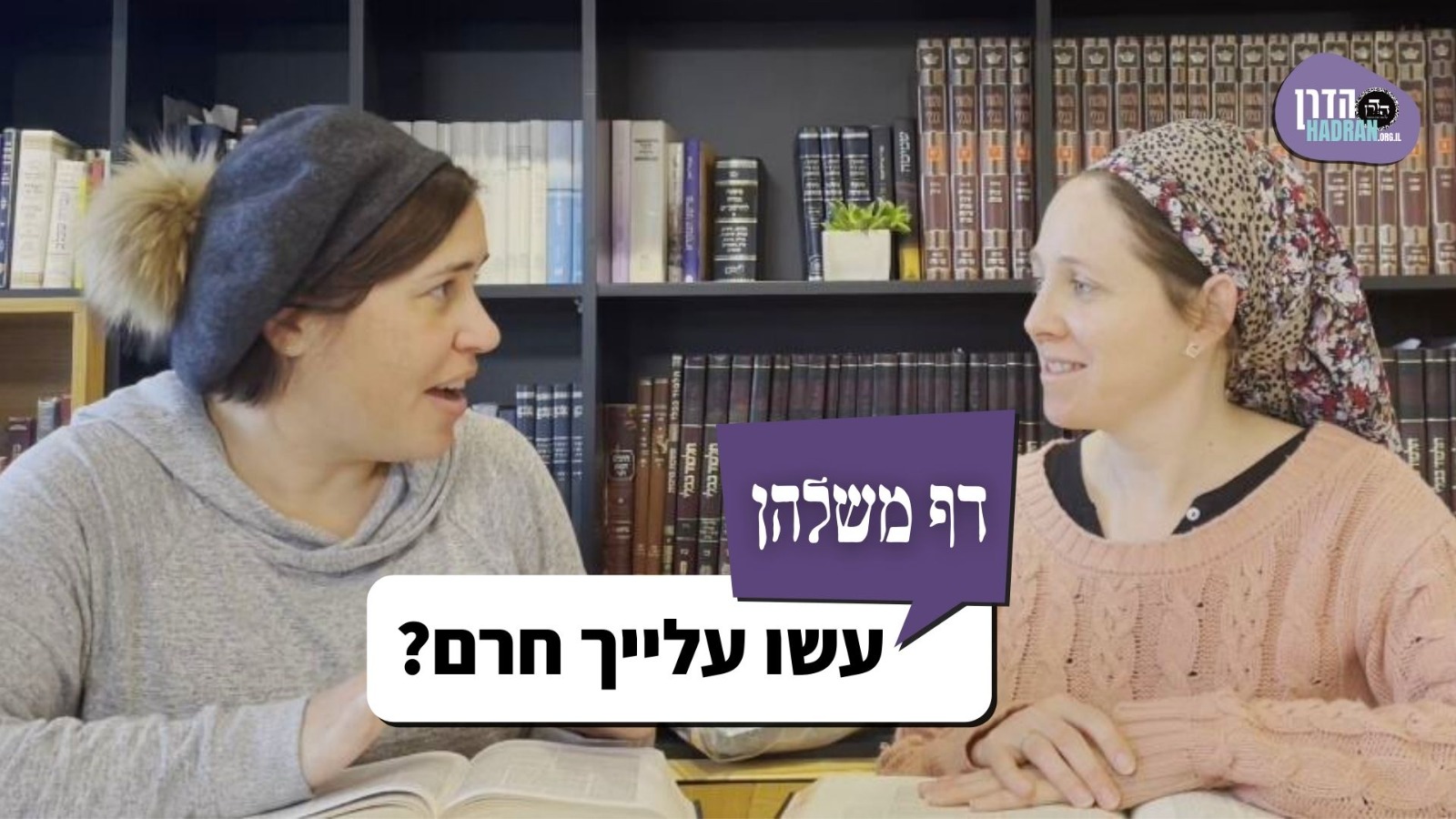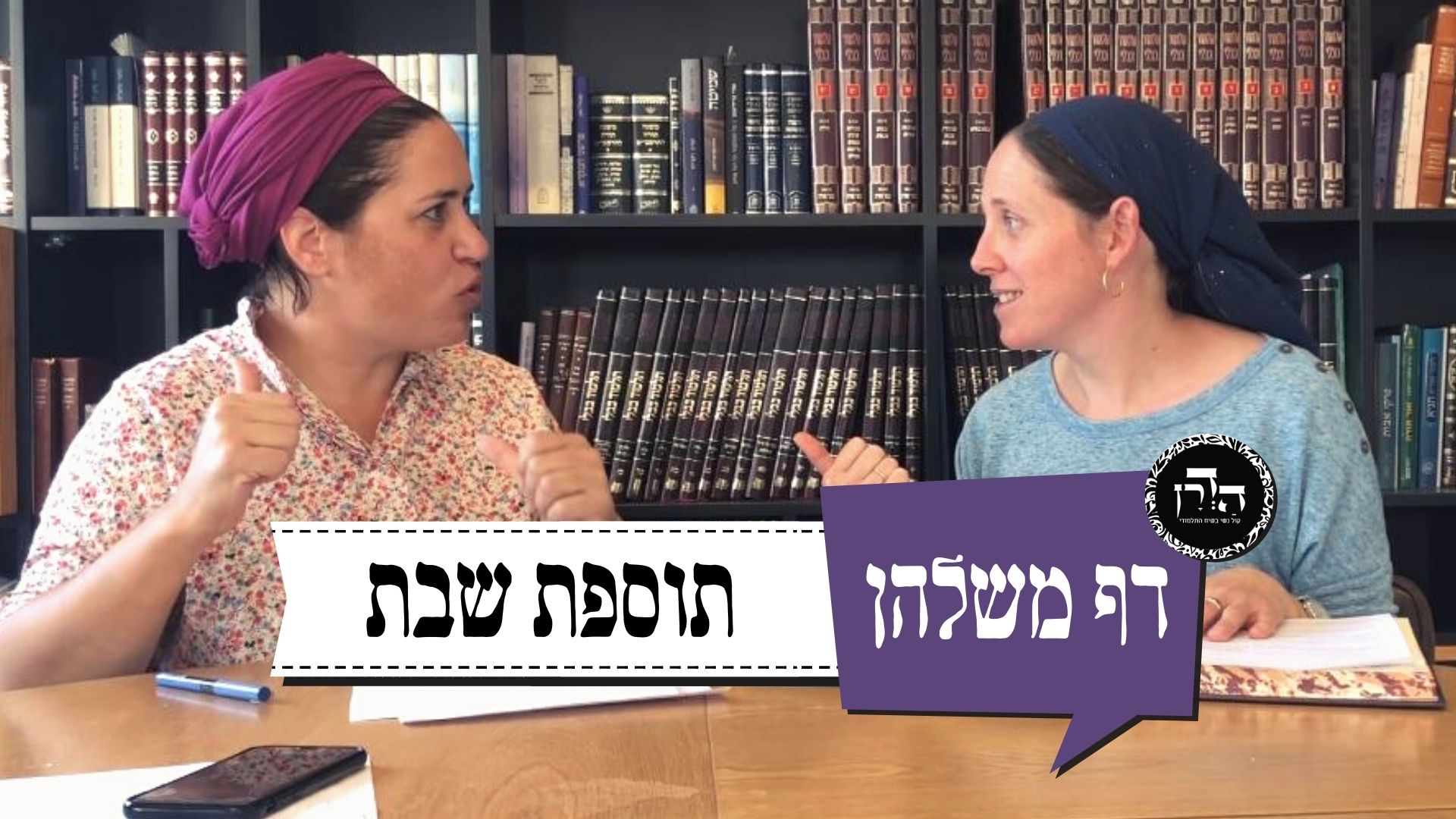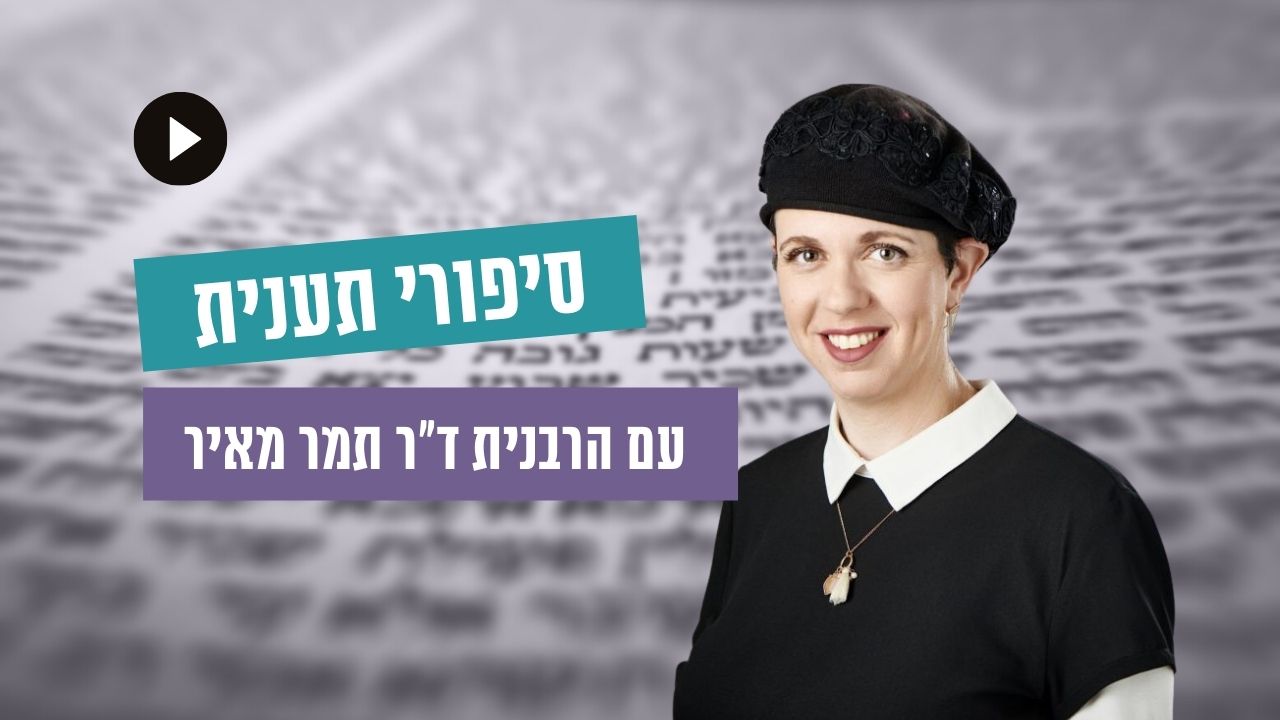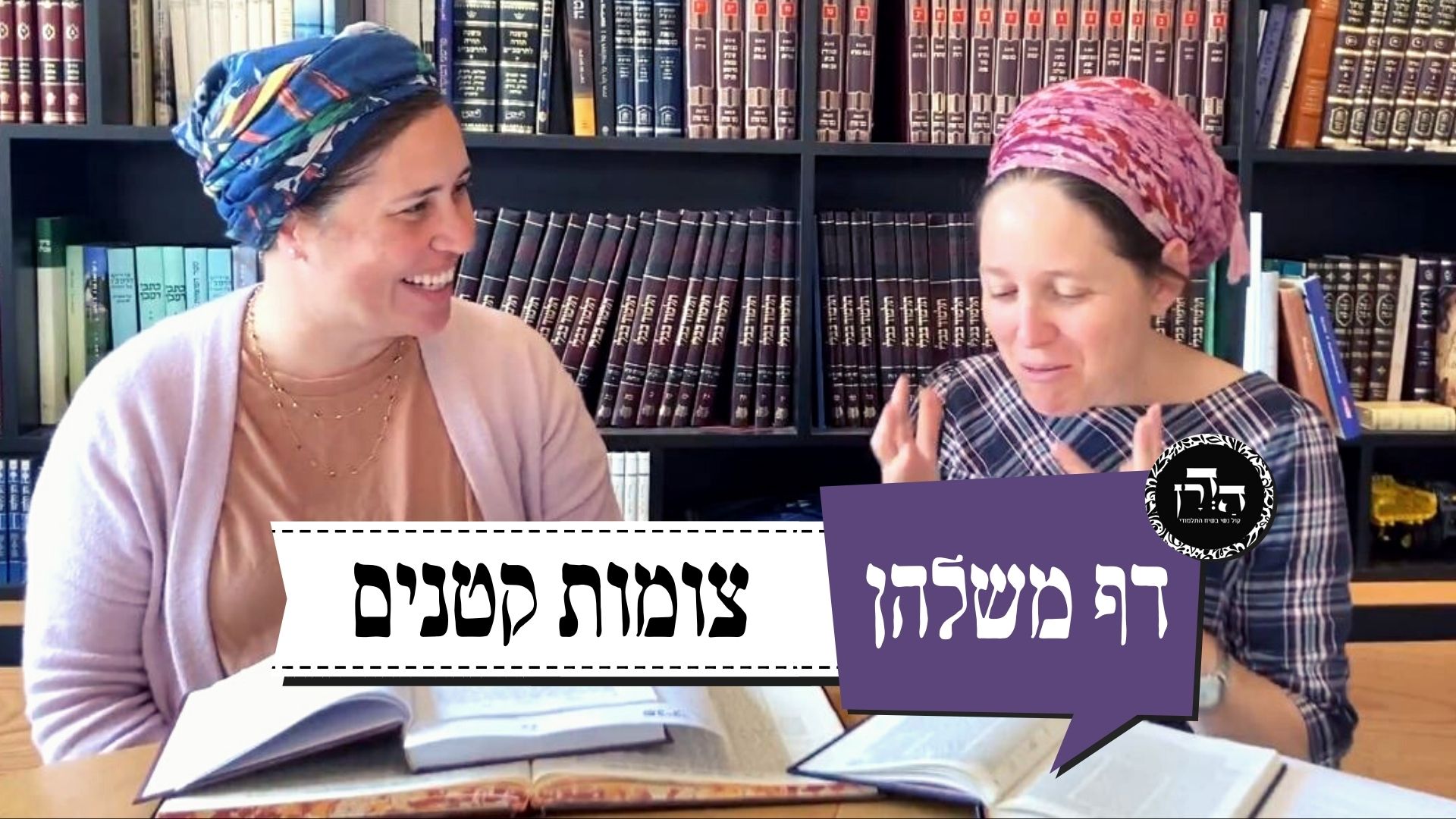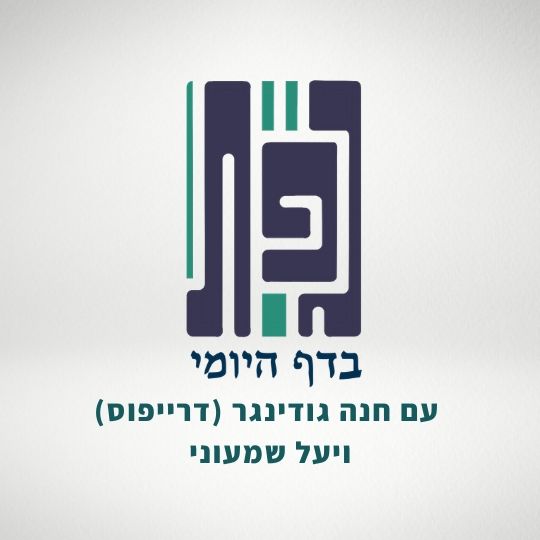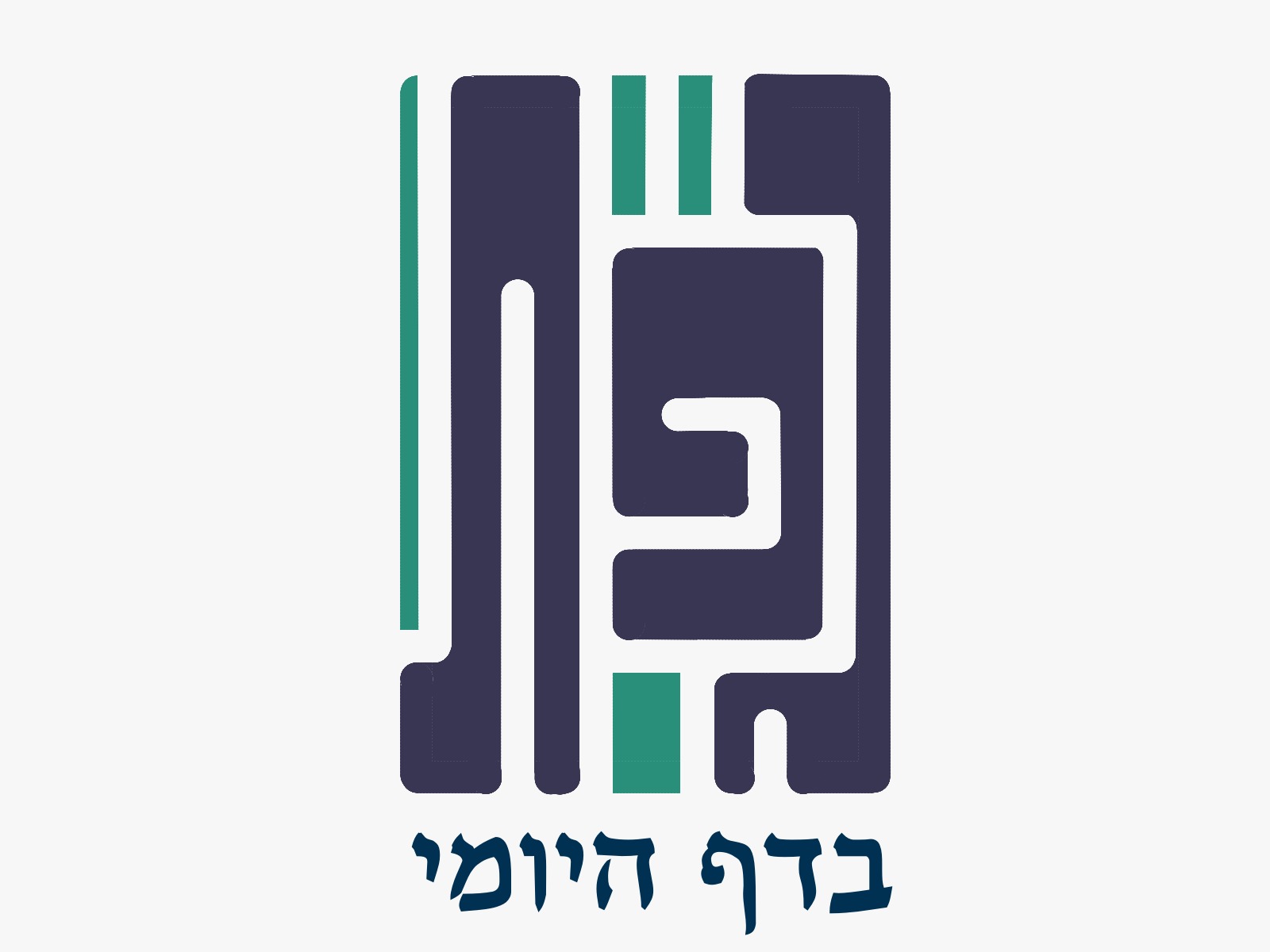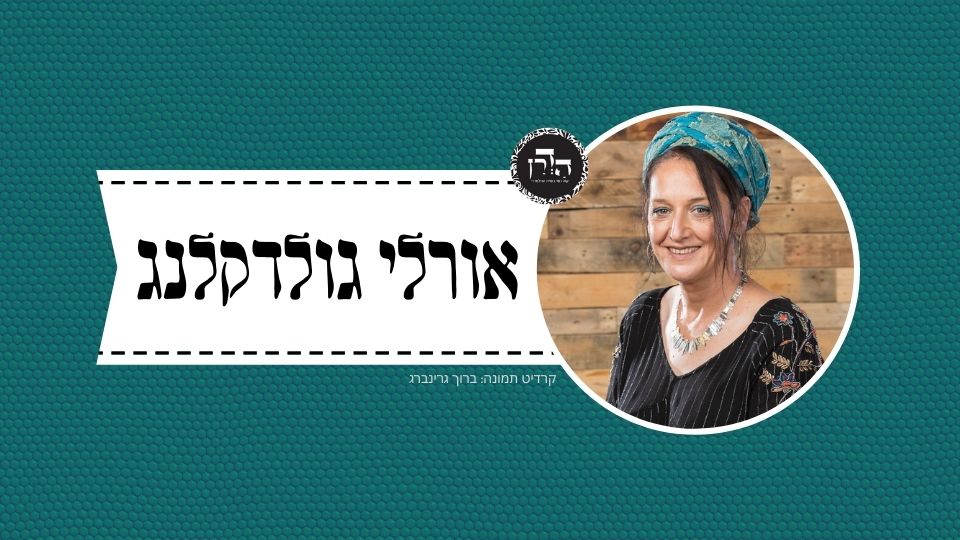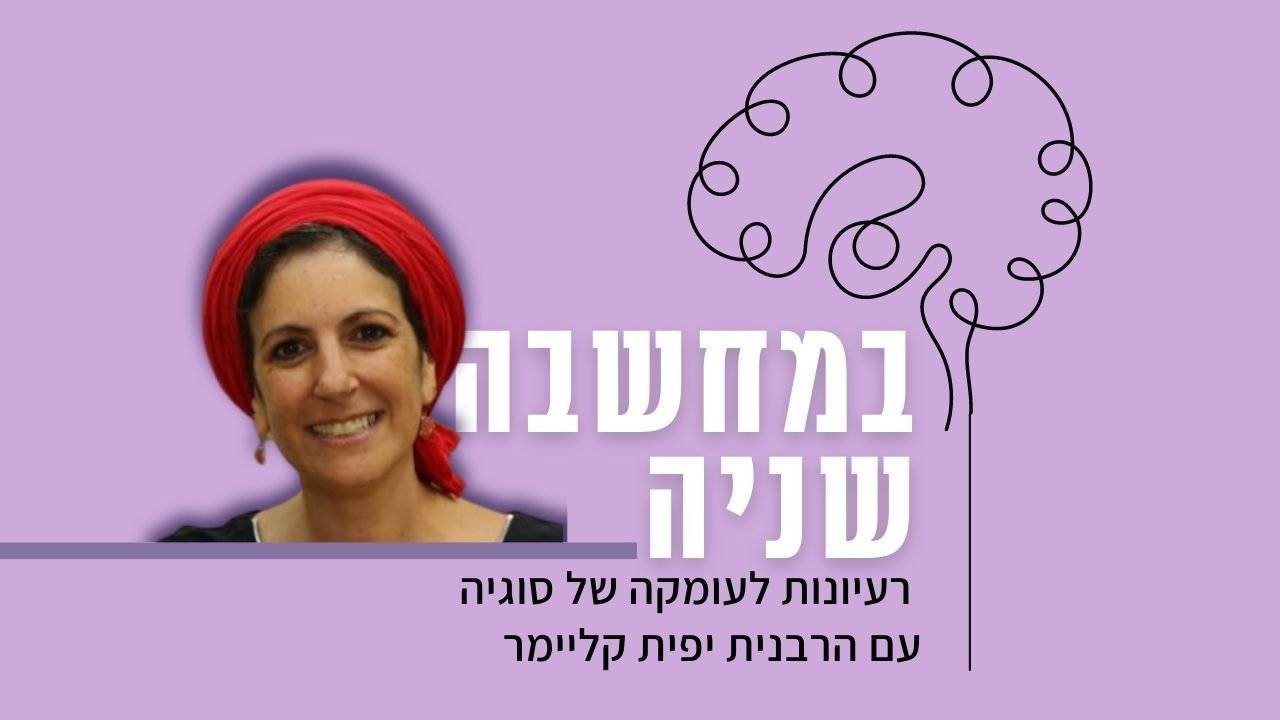ניסיון להבין שיטת ר’ יהודה שאוסר רק את ירך ימין – האם מספק או שברור לו? הבאת מקורות שונים כדי להוכיח. דרשות על הסיפור של יעקב עם המלאך וגם על הסיפור של חלום יעקב עם המלאכים עולים ויורדים בסולם.
הלימוד השבוע מוקדש לזכות ולשלום הַיְימׇנוֹט אֱמוּנָה בַּת באנצ’י (קָסָאוּ) בת 11 שנעלמה במקום מגוריה בצפת, לפני שנתיים, ביום ט”ז אדר תשפ”ד (25.2.24), ולא נודעו עקבותיה.
הלימוד השבוע מוקדש למען ביטחון המדינה, החיילים והאזרחים, ולמען חירותו של העם האיראני. שנזכה בקרוב שיתקיים בנו הפסוק: "לַיְּהוּדִים הָיְתָה אוֹרָה וְשִׂמְחָה וְשָׂשֹׂן וִיקָר”.
רוצה להקדיש שיעור?

כלים
הלימוד השבוע מוקדש לזכות ולשלום הַיְימׇנוֹט אֱמוּנָה בַּת באנצ’י (קָסָאוּ) בת 11 שנעלמה במקום מגוריה בצפת, לפני שנתיים, ביום ט”ז אדר תשפ”ד (25.2.24), ולא נודעו עקבותיה.
הלימוד השבוע מוקדש למען ביטחון המדינה, החיילים והאזרחים, ולמען חירותו של העם האיראני. שנזכה בקרוב שיתקיים בנו הפסוק: "לַיְּהוּדִים הָיְתָה אוֹרָה וְשִׂמְחָה וְשָׂשֹׂן וִיקָר”.
כלים
העמקה
רוצה להבין מה באמת קורה מתחת לפני השטח של הסוגיה?
שיעורים, פודקאסטים והרחבות של מיטב המורות שלנו יפתחו לך עוד זוויות וכיווני חשיבה.
חדשה בלימוד הגמרא?
זה הדף הראשון שלך? איזו התרגשות עצומה! יש לנו בדיוק את התכנים והכלים שיעזרו לך לעשות את הצעדים הראשונים ללמידה בקצב וברמה שלך, כך תוכלי להרגיש בנוח גם בתוך הסוגיות המורכבות ומאתגרות.
פסיפס הלומדות שלנו
גלי את קהילת הלומדות שלנו, מגוון נשים, רקעים וסיפורים. כולן חלק מתנועה ומסע מרגש ועוצמתי.
חולין צא
רַב אָשֵׁי אָמַר: לֹא נִצְרְכָה אֶלָּא לְשׇׁמְנוֹ, דְּתַנְיָא: שׇׁמְנוֹ מוּתָּר, וְיִשְׂרָאֵל קְדוֹשִׁים נָהֲגוּ בּוֹ אִיסּוּר.
Rav Ashi said: The mishna’s ruling that the sinews must be burned is necessary only with regard to the fat around the sciatic nerve, as it is taught in a baraita: The fat around the sciatic nerve is permitted by Torah law, but the Jewish people are holy and treated it as forbidden. Since it is permitted by Torah law, it has the status of sacrificial meat and may not be simply discarded. Nevertheless, since the Jewish people treat it as forbidden, they do not eat it even from the Paschal offering, despite the mitzva to eat that offering in its entirety. Therefore, it is left until after the time when the meat may be eaten and it is burned as leftover sacrificial meat.
רָבִינָא אָמַר: לֹא נִצְרְכָה אֶלָּא לְכִדְרַב יְהוּדָה אָמַר שְׁמוּאֵל, דְּאָמַר רַב יְהוּדָה אָמַר שְׁמוּאֵל, שְׁנֵי גִידִין הֵן: פְּנִימִי סָמוּךְ לְעֶצֶם – אָסוּר, וְחַיָּיבִין עָלָיו; חִיצוֹן סָמוּךְ לְבָשָׂר – אָסוּר, וְאֵין חַיָּיבִין עָלָיו.
Ravina said: The mishna’s statement is necessary only with regard to the outer nerve, and it is in accordance with that which Rav Yehuda said that Shmuel said. As Rav Yehuda said that Shmuel said: There are two nerves included in the prohibition of the sciatic nerve. The inner nerve that is next to the bone is forbidden by Torah law, and one is liable to be flogged for eating it. The outer nerve that is next to the flesh is forbidden by rabbinic law, and therefore one is not liable to be flogged for eating it. In the case of a Paschal offering, since the outer nerve is permitted by Torah law, it assumes the status of leftover sacrificial meat when it is not eaten.
תָּא שְׁמַע: אָכַל מִזֶּה כְּזַיִת וּמִזֶּה כְּזַיִת – סוֹפֵג שְׁמוֹנִים, רַבִּי יְהוּדָה אוֹמֵר: אֵינוֹ סוֹפֵג אֶלָּא אַרְבָּעִים.
The Gemara suggests: Come and hear another resolution to the dilemma about Rabbi Yehuda’s statement, from a mishna (96a): If one ate an olive-bulk from this sciatic nerve of the right leg and an olive-bulk from that sciatic nerve of the left leg, he incurs eighty lashes. Rabbi Yehuda says: He incurs only forty lashes.
אִי אָמְרַתְּ בִּשְׁלָמָא מִיפְשָׁט פְּשִׁיטָא לֵיהּ – שַׁפִּיר, אֶלָּא אִי אָמְרַתְּ סַפּוֹקֵי מְסַפְּקָא לֵיהּ – הָוְיָא לַהּ הַתְרָאַת סָפֵק, וְשָׁמְעִינַן לֵיהּ לְרַבִּי יְהוּדָה דְּאָמַר: הַתְרָאַת סָפֵק לֹא שְׁמָהּ הַתְרָאָה.
Granted, if you say it is obvious to Rabbi Yehuda that the sciatic nerve of the right thigh is the one forbidden by Torah law, it is well. But if you say he is uncertain, why would he hold that one incurs any lashes? When the individual is forewarned not to partake of each sciatic nerve, which is necessary in order to be liable for incurring lashes, it is an uncertain forewarning, and we have heard about Rabbi Yehuda that he said: An uncertain forewarning is not characterized as forewarning.
דְּתַנְיָא: הִכָּה אֶת זֶה, וְחָזַר וְהִכָּה אֶת זֶה, קִלֵּל אֶת זֶה, וְחָזַר וְקִלֵּל אֶת זֶה, הִכָּה שְׁנֵיהֶם בְּבַת אַחַת, אוֹ שֶׁקִּלֵּל שְׁנֵיהֶם בְּבַת אַחַת – חַיָּיב. רַבִּי יְהוּדָה אוֹמֵר: בְּבַת אַחַת – חַיָּיב, בְּזֶה אַחַר זֶה – פָּטוּר.
As it is taught in a baraita: If one is uncertain which of two men is his father and he struck this one and then struck that one, or cursed this one and then cursed that one, or struck both of them simultaneously, or cursed both of them simultaneously, he is liable to receive the death penalty, as he certainly struck or cursed his father. Rabbi Yehuda says: If he struck or cursed both of them simultaneously he is liable, provided he was forewarned that his action will certainly render him liable to receive the death penalty. But if he struck or cursed them one after the other he is exempt. Apparently, Rabbi Yehuda is of the opinion that one is not punished after uncertain forewarning; since in this case it is impossible to determine which of them is the father, inevitably each forewarning is uncertain. Similarly, if Rabbi Yehuda is uncertain which sciatic nerve is forbidden by Torah law, he should hold that since the forewarning before eating either sciatic nerve is uncertain, one who consumes both should be exempt.
הַאי תַּנָּא סָבַר לַהּ כְּאִידַּךְ תַּנָּא דְּרַבִּי יְהוּדָה, דְּאָמַר: הַתְרָאַת סָפֵק שְׁמָהּ הַתְרָאָה.
The Gemara answers: This tanna of that mishna, on 96a, holds in accordance with the opinion of another tanna with regard to the opinion of Rabbi Yehuda, who said that Rabbi Yehuda holds that an uncertain forewarning is characterized as forewarning.
דְּתַנְיָא: ״לֹא תוֹתִירוּ מִמֶּנּוּ עַד בֹּקֶר וְגוֹ׳״ – בָּא הַכָּתוּב לִיתֵּן עֲשֵׂה אַחַר לֹא תַעֲשֶׂה, לוֹמַר שֶׁאֵין לוֹקִין עָלָיו, דִּבְרֵי רַבִּי יְהוּדָה.
As it is taught in a baraita: The verse states with regard to the Paschal offering: “And you shall not leave any of it until morning; but that which remains of it until morning you shall burn with fire” (Exodus 12:10). The verse comes to provide a positive mitzva to burn the leftover meat after it has taught a prohibition against leaving it over, to say that one is not flogged for violation of the prohibition; this is the statement of Rabbi Yehuda. Rabbi Yehuda holds that one is not flogged for any transgression that can be rectified by the performance of a positive mitzva.
רַבִּי יַעֲקֹב אוֹמֵר: לֹא מִן הַשֵּׁם הוּא זֶה, אֶלָּא מִשּׁוּם דְּהָוֵה לָאו שֶׁאֵין בּוֹ מַעֲשֶׂה, וְכׇל לָאו שֶׁאֵין בּוֹ מַעֲשֶׂה – אֵין לוֹקִין עָלָיו.
Rabbi Ya’akov says: This, the halakha that one is not flogged, is not for that reason. Rather, it is because leaving over sacrificial meat is a prohibition that does not involve an action, as one violates the prohibition through failure to take action, and concerning any prohibition that does not involve an action, one is not flogged for its violation. The forewarning one could receive for this transgression is an uncertain one, because witnesses who forewarn the individual cannot be certain until daybreak that he will leave it over. Nevertheless, this baraita indicates that if not for the fact that leaving over sacrificial meat can be rectified by a positive mitzva, Rabbi Yehuda would hold that one is flogged for leaving over sacrificial meat.
תָּא שְׁמַע: אָכַל שְׁנֵי גִידִין מִשְּׁתֵּי יְרֵכוֹת מִשְּׁתֵּי בְהֵמוֹת – סוֹפֵג שְׁמוֹנִים; רַבִּי יְהוּדָה אוֹמֵר: אֵינוֹ סוֹפֵג אֶלָּא אַרְבָּעִים.
The Gemara suggests: Come and hear a resolution of the uncertainty with regard to the opinion of Rabbi Yehuda from a baraita: If one ate two sciatic nerves from two thighs of two different animals, he incurs eighty lashes. Rabbi Yehuda says: He incurs only forty lashes.
מִדְּקָאָמַר מִשְׁתֵּי יְרֵכוֹת מִשְּׁתֵּי בְהֵמוֹת, פְּשִׁיטָא דְּתַרְוַיְיהוּ לְאִיסּוּרָא, וּלְרַבִּי יְהוּדָה אִיצְטְרִיךְ. שְׁמַע מִינַּהּ מִיפְשָׁט פְּשִׁיטָא לֵיהּ, שְׁמַע מִינַּהּ.
The Gemara comments: From the fact that the first tanna said that he was referring to two thighs of two different animals, it is obvious that he meant they were both from the right thigh, because if one were from the right thigh and one were from the left thigh it would not matter if they were from two different animals or from the same animal. Consequently, both sciatic nerves are definitely forbidden by Torah law, and according to the first tanna one incurs eighty lashes for eating them. And it was necessary to teach that according to Rabbi Yehuda one incurs only forty lashes, as will be explained. Conclude from this baraita that it is obvious to Rabbi Yehuda that it is the sciatic nerve of the right thigh that is forbidden by Torah law. The Gemara affirms: Conclude from it that this is Rabbi Yehuda’s opinion.
וְאִי פְּשִׁיטָא לֵיהּ, אַמַּאי סוֹפֵג אַרְבָּעִים וְתוּ לָא? לִילְקֵי שְׁמוֹנִים! הָכָא בְּמַאי עָסְקִינַן – כְּגוֹן דְּלֵית בּוֹ כְּזַיִת, דְּתַנְיָא: אֲכָלוֹ וְאֵין בּוֹ כְּזַיִת – חַיָּיב, רַבִּי יְהוּדָה אוֹמֵר: עַד שֶׁיְּהֵא בּוֹ כְּזַיִת.
The Gemara seeks to clarify the baraita: But if it is obvious to Rabbi Yehuda that the sciatic nerve from the right thigh is prohibited by Torah law, why does he incur forty lashes and nothing more? Let him be flogged eighty times. The Gemara answers: Here we are dealing with a case where the volume of one of the sciatic nerves is not an olive-bulk, and Rabbi Yehuda holds that in such a case one is not flogged for its consumption. As it is taught in a baraita: If one ate the entire sciatic nerve and its volume is not an olive-bulk, he is nevertheless liable to be flogged, because he ate a complete, natural unit of forbidden food. Rabbi Yehuda says: He is not liable unless it has a volume of at least an olive-bulk.
וְטַעְמָא מַאי? אָמַר רָבָא: אָמַר קְרָא ״הַיָּרֵךְ״ – הַמְיוּמֶּנֶת שֶׁבַּיָּרֵךְ.
The Gemara asks: And what is the reason that Rabbi Yehuda holds that only the sciatic nerve of the right thigh is forbidden by Torah law? Rava said that it is because the verse states: “Therefore the children of Israel eat not the sciatic nerve that is upon the spoon of the thigh” (Genesis 32:33). The definite article indicates that this is referring to the most important thigh.
וְרַבָּנַן, הַהוּא דְּפָשֵׁיט אִיסּוּרֵיהּ בְּכוּלֵּיהּ יָרֵךְ, לְאַפּוֹקֵי חִיצוֹן דְּלָא.
And the Rabbis, who hold that the sciatic nerves of both the right and left thighs are forbidden by Torah law, explain the definite article as teaching that the prohibition applies to the one whose prohibition spreads through the entire thigh, i.e., the inner nerve. This serves to exclude the outer nerve, which is not prohibited by Torah law.
וְרַבִּי יְהוֹשֻׁעַ בֶּן לֵוִי אָמַר: אָמַר קְרָא ״בְּהֵאָבְקוֹ עִמּוֹ״ – כְּאָדָם שֶׁחוֹבֵק אֶת חֲבֵירוֹ, וְיָדוֹ מַגַּעַת לְכַף יְמִינוֹ שֶׁל חֲבֵירוֹ.
And Rabbi Yehoshua ben Levi said that Rabbi Yehuda holds that the sciatic nerve of the right thigh is forbidden because the verse states: “And when he saw that he could not prevail against him, he touched the spoon of his thigh; and the spoon of Jacob’s thigh was strained, as he wrestled with him” (Genesis 32:26). The angel grappled with Jacob like a man who hugs another in order to throw him to the ground, and his hand reaches to the spoon of the right thigh of the other.
רַבִּי שְׁמוּאֵל בַּר נַחְמָנִי אָמַר: כְּגוֹי נִדְמָה לוֹ, דְּאָמַר מָר: יִשְׂרָאֵל שֶׁנִּטְפַּל לוֹ גּוֹי בַּדֶּרֶךְ – טוֹפְלוֹ לִימִינוֹ.
Rabbi Shmuel bar Naḥmani says: The angel appeared to him as a gentile, as the Master said: A Jew who is joined by a gentile on the road and continues his travels with him should position the gentile to his right, close to one’s dominant hand. This allows the Jew to defend himself against any potential attack. Since Jacob followed this practice, it was therefore Jacob’s right thigh that the angel touched.
רַב שְׁמוּאֵל בַּר אַחָא קַמֵּיהּ דְּרַב פָּפָּא מִשְּׁמֵיהּ דְּרָבָא בַּר עוּלָּא אָמַר: כְּתַלְמִיד חָכָם נִדְמָה לוֹ, דְּאָמַר מָר: הַמְהַלֵּךְ לִימִין רַבּוֹ – הֲרֵי זֶה בּוּר.
Rav Shmuel bar Aḥa said before Rav Pappa in the name of Rava bar Ulla that the angel appeared to Jacob as a Torah scholar, and therefore Jacob positioned the angel on his right side, as the Master said: One who walks to the right of his teacher is an ignoramus, in that he does not know how to act with good manners. Consequently, it was Jacob’s right thigh that the angel touched.
וְרַבָּנַן, מֵאֲחוֹרֵיהּ אֲתָא, וְנַשְּׁיֵיהּ בְּתַרְוַיְיהוּ.
And the Rabbis, who hold that the sciatic nerves of both thighs are forbidden, understand that the angel came from behind Jacob and hit him on both thighs.
וְרַבָּנַן, הַאי ״בְּהֵאָבְקוֹ עִמּוֹ״ מַאי דָּרְשִׁי בֵּיהּ? מִבְּעֵי לֵיהּ לִכְאִידַּךְ דְּרַבִּי יְהוֹשֻׁעַ בֶּן לֵוִי, דְּאָמַר רַבִּי יְהוֹשֻׁעַ בֶּן לֵוִי: מְלַמֵּד שֶׁהֶעֱלוּ אֲבַק מַרְגְּלוֹתָם עַד כִּסֵּא הַכָּבוֹד, כְּתִיב הָכָא ״בְּהֵאָבְקוֹ עִמּוֹ״, וּכְתִיב הָתָם ״וְעָנָן אֲבַק רַגְלָיו״.
The Gemara asks: And the Rabbis, what do they derive from this phrase: “As he wrestled with him” (Genesis 32:26)? The Gemara answers: They require it for the other interpretation of Rabbi Yehoshua ben Levi, as Rabbi Yehoshua ben Levi said: This teaches that the dust [avak] from their feet ascended to the throne of glory. It is written here: “As he wrestled [behe’avko] with him,” and it is written there in a description of how God will punish the wicked: “The Lord, in the whirlwind and in the storm is His way, and the clouds are the dust of His feet” (Nahum 1:3).
וְאָמַר רַבִּי יְהוֹשֻׁעַ בֶּן לֵוִי: לָמָּה נִקְרָא שְׁמוֹ גִּיד הַנָּשֶׁה? שֶׁנָּשָׁה מִמְּקוֹמוֹ וְעָלָה, וְכֵן הוּא אוֹמֵר: ״נָשְׁתָה גְבוּרָתָם הָיוּ לְנָשִׁים״.
§ The Gemara cites another statement of Rabbi Yehoshua ben Levi concerning the sciatic nerve: And Rabbi Yehoshua ben Levi says: Why is its name called sciatic nerve [gid hanashe]? It is because the sciatic nerve left [nasha] its place and rose. And similarly the verse says: “The mighty men of Babylon have ceased to fight, they remain in their strongholds; their might has left [nashata], they are become as women” (Jeremiah 51:30).
אָמַר רַבִּי יוֹסֵי בְּרַבִּי חֲנִינָא: מַאי דִּכְתִיב ״דָּבָר שָׁלַח בְּיַעֲקֹב וְנָפַל בְּיִשְׂרָאֵל״? ״דָּבָר שָׁלַח בְּיַעֲקֹב״ – זֶה גִּיד הַנָּשֶׁה, ״וְנָפַל בְּיִשְׂרָאֵל״ – שֶׁפָּשַׁט אִיסּוּרוֹ בְּכׇל יִשְׂרָאֵל.
The Gemara continues with other expositions pertaining to the sciatic nerve. Rabbi Yosei, son of Rabbi Ḥanina, said: What is the meaning of that which is written: “The Lord sent a word to Jacob, and it has fallen upon Israel” (Isaiah 9:7)? “He sent a word to Jacob”; this is a reference to the sciatic nerve. “And it has fallen upon Israel”; this teaches that its prohibition has been extended to the entire Jewish people.
וְאָמַר רַבִּי יוֹסֵי בְּרַבִּי חֲנִינָא: מַאי דִּכְתִיב ״וּטְבוֹחַ טֶבַח וְהָכֵן״? פְּרַע לָהֶן בֵּית הַשְּׁחִיטָה, ״וְהָכֵן״ – טוֹל גִּיד הַנָּשֶׁה בִּפְנֵיהֶם, כְּמַאן דְּאָמַר גִּיד הַנָּשֶׁה נֶאֱסָר לִבְנֵי נֹחַ.
And Rabbi Yosei, son of Rabbi Ḥanina, also said: What is the meaning of that which is written: “And when Joseph saw Benjamin with them, he said to the steward of his house: Bring the men into the house, and slaughter the animals, and prepare the meat; for the men shall dine with me at noon” (Genesis 43:16)? Joseph commanded his steward: Expose the place of the slaughter on the neck of the animal to them so that the brothers will know that it is being slaughtered correctly. “And prepare” teaches that Joseph instructed the steward to remove the sciatic nerve in their presence so that the brothers would know that it had been fully removed. The Gemara comments that this opinion is according to the one who said that the sciatic nerve was forbidden to the children of Jacob even before the Torah was given, when they still had the status of descendants of Noah.
״וַיִּוָּתֵר יַעֲקֹב לְבַדּוֹ״, אָמַר רַבִּי אֶלְעָזָר: שֶׁנִּשְׁתַּיֵּיר עַל פַּכִּין קְטַנִּים, מִכָּאן לַצַּדִּיקִים שֶׁחָבִיב עֲלֵיהֶם מָמוֹנָם יוֹתֵר מִגּוּפָם, וְכׇל כָּךְ לָמָּה? לְפִי שֶׁאֵין פּוֹשְׁטִין יְדֵיהֶן בְּגָזֵל.
The Gemara returns to the verse of Jacob wrestling with the angel. The verse states: “And Jacob was left alone; and a man wrestled with him until the breaking of the day” (Genesis 32:25). Rabbi Elazar says: The reason Jacob remained alone was that he remained to collect some small pitchers that had been left behind. From here it is derived that the possessions of the righteous are dearer to them than their bodies. And why do they care so much about their possessions? It is because they do not stretch out their hands to partake of stolen property.
״וַיֵּאָבֵק אִישׁ עִמּוֹ עַד עֲלוֹת הַשָּׁחַר״, אָמַר רַבִּי יִצְחָק: מִכָּאן לְתַלְמִיד חָכָם שֶׁלֹּא יֵצֵא יְחִידִי בַּלַּיְלָה. רַבִּי אַבָּא בַּר כָּהֲנָא אָמַר מֵהָכָא:
The verse states: “And a man wrestled with him until the breaking of the day.” Rabbi Yitzḥak says: From here it is derived that a Torah scholar should not go out of his house alone at night, as Jacob went out alone at night and was injured. Rabbi Abba bar Kahana said that the source for this instruction is from here:
״הִנֵּה הוּא זֹרֶה אֶת גֹּרֶן הַשְּׂעֹרִים״.
“And now is there not Boaz our kinsman, whose maidens you were with? Behold, he winnows barley tonight in the threshing floor…and it shall be, when he lies down, that you shall mark the place where he shall lie” (Ruth 3:2–3). This teaches that the reason Boaz did not return home from the threshing floor was that a Torah scholar should not go out alone at night.
רַבִּי אֲבָהוּ אָמַר מֵהָכָא: ״וַיַּשְׁכֵּם אַבְרָהָם בַּבֹּקֶר וַיַּחֲבֹשׁ אֶת וְגוֹ׳״.
Rabbi Abbahu said that the source is from here: “And Abraham rose early in the morning, and saddled his donkey, and took two of his young men with him and Isaac his son; and he split the wood for the burnt offering, and rose up, and went to the place that God had told him” (Genesis 22:3). The fact that Abraham waited until morning and did not set off at night, even though others were traveling with him, indicates that a Torah scholar should not go out at night at all, and certainly not alone.
וְרַבָּנַן אָמְרִי מֵהָכָא: ״לֶךְ נָא רְאֵה אֶת שְׁלוֹם אַחֶיךָ וְאֶת שְׁלוֹם וְגוֹ׳״.
And the Rabbis say that the source is from here, the verse that describes when Jacob sent Joseph to his brothers: “And he said to him: Go now, see whether it is well with you brothers and well with the flock; and bring me back word. So he sent him out of the valley of Hebron, and he came to Shechem” (Genesis 37:14). The verse indicates that Jacob sent Joseph at a time when he could see his brothers, i.e., during the day. This shows that a Torah scholar should not go out alone at night.
רַב אָמַר מֵהָכָא: ״וַיִּזְרַח לוֹ הַשֶּׁמֶשׁ״.
Rav said that the source is from here: “And the sun rose for him as he passed over Peniel, and he limped upon his thigh” (Genesis 32:32). This indicates that Jacob remained where he was all night and left in the morning, because a Torah scholar should not go out alone at night.
אָמַר רַבִּי עֲקִיבָא: שָׁאַלְתִּי אֶת רַבָּן גַּמְלִיאֵל וְאֶת רַבִּי יְהוֹשֻׁעַ בָּאִיטְלִיז שֶׁל אִימָאוּם, שֶׁהָלְכוּ לִיקַּח בְּהֵמָה לְמִשְׁתֵּה בְנוֹ שֶׁל רַבָּן גַּמְלִיאֵל. כְּתִיב ״וַיִּזְרַח לוֹ הַשֶּׁמֶשׁ״, וְכִי שֶׁמֶשׁ לוֹ לְבַד זָרְחָה? וַהֲלֹא לְכׇל הָעוֹלָם זָרְחָה!
The Gemara cites an incident involving the final verse cited above. Rabbi Akiva says: I asked the following question of Rabban Gamliel and Rabbi Yehoshua in the meat market [be’itliz] of the town Emmaus, where they went to purchase an animal for the wedding feast of Rabban Gamliel’s son: It is written in the verse: “And the sun shone for him when he passed Peniel, and he limped upon his thigh” (Genesis 32:32). But did the sun shine only for him? Didn’t it shine for the entire world?
אָמַר רַבִּי יִצְחָק: שֶׁמֶשׁ הַבָּאָה בַּעֲבוּרוֹ זָרְחָה בַּעֲבוּרוֹ, דִּכְתִיב: ״וַיֵּצֵא יַעֲקֹב מִבְּאֵר שָׁבַע וַיֵּלֶךְ חָרָנָה״, וּכְתִיב: ״וַיִּפְגַּע בַּמָּקוֹם״. כִּי מְטָא לְחָרָן אָמַר: אֶפְשָׁר עָבַרְתִּי עַל מָקוֹם שֶׁהִתְפַּלְּלוּ אֲבוֹתַי וַאֲנִי לֹא הִתְפַּלַּלְתִּי? כַּד יָהֵיב דַּעְתֵּיהּ לְמִיהְדַּר, קְפַצָה לֵיהּ אַרְעָא, מִיָּד – ״וַיִּפְגַּע בַּמָּקוֹם״.
Rabbi Yitzḥak says: The verse means that the sun, which set early exclusively for him, also shone early exclusively for him in order to rectify the disparity created by the premature sunset. The Gemara explains when the sun set early for him: As it is written: “And Jacob went out from Beersheba and went toward Haran” (Genesis 28:10). And it is written thereafter: “And he encountered the place, and he slept there, because the sun had set” (Genesis 28:11). When Jacob arrived at Haran, he said: Is it possible that I passed a place where my fathers prayed and I did not pray there? When he set his mind to return, the land contracted for him. Immediately the verse states: “And he encountered the place,” indicating that he arrived there miraculously.
כַּד צַלִּי, בָּעֵי לְמֶיהְדַּר, אָמַר הַקָּדוֹשׁ בָּרוּךְ הוּא: צַדִּיק זֶה בָּא לְבֵית מְלוֹנִי, וְיִפָּטֵר בְּלֹא לִינָה? מִיָּד, ״בָּא הַשֶּׁמֶשׁ״.
When he had finished praying and he wanted to return to Haran, the Holy One, Blessed be He, said: This righteous man came to my lodging place and he will depart without remaining overnight? Immediately, the sun set before its proper time so that Jacob would stay overnight in that place.
כְּתִיב ״וַיִּקַּח מֵאַבְנֵי הַמָּקוֹם״, וּכְתִיב ״וַיִּקַּח אֶת הָאֶבֶן״. אָמַר רַבִּי יִצְחָק: מְלַמֵּד שֶׁנִּתְקַבְּצוּ כׇּל אוֹתָן אֲבָנִים לְמָקוֹם אֶחָד, וְכׇל אַחַת וְאַחַת אוֹמֶרֶת: ״עָלַי יַנִּיחַ צַדִּיק זֶה רֹאשׁוֹ״. תָּנָא: וְכוּלָּן נִבְלְעוּ בְּאֶחָד.
The Gemara cites another exposition of Rabbi Yitzḥak to explain an apparent contradiction between two verses pertaining to this incident. It is written: “And he took of the stones of the place, and placed them under his head, and lay down in that place to sleep” (Genesis 28:11). And it is written: “And Jacob rose up early in the morning, and he took the stone that he had placed under his head, and set it up for a pillar, and poured oil upon the top of it” (Genesis 28:18). The first verse indicates that Jacob took several stones, whereas the latter verse indicates that he took only one stone. Rabbi Yitzḥak says: This teaches that all those stones gathered to one place and each one said: Let this righteous man place his head upon me. And it was taught: And all of them were absorbed into one large rock.
״וַיַּחֲלֹם וְהִנֵּה סֻלָּם מֻצָּב אַרְצָה״, תָּנָא: כַּמָּה רׇחְבּוֹ שֶׁל סוּלָּם? שְׁמוֹנַת אֲלָפִים פַּרְסָאוֹת, דִּכְתִיב: ״וְהִנֵּה מַלְאֲכֵי אֱלֹהִים עוֹלִים וְיוֹרְדִים בּוֹ״, ״עוֹלִים״ – שְׁנַיִם, ״וְיוֹרְדִים״ – שְׁנַיִם, וְכִי פָגְעוּ בַּהֲדֵי הֲדָדֵי הָווּ לְהוּ אַרְבָּעָה.
The Gemara expounds other verses pertaining to the same incident. The verse states: “And he dreamed, and behold a ladder set up on the earth, and the top of it reached to heaven; and behold the angels of God ascending and descending on it” (Genesis 28:12). It was taught: How wide was the ladder? It was eight thousand parasangs [parsaot], as it is written: “And behold the angels of God ascending and descending on it.” The word “ascending [olim],” written in plural, indicates that there were two angels ascending simultaneously. Likewise, the term “and descending [veyordim],” also in the plural, indicates that two angels were descending simultaneously. And when they met one another they were a total of four in one place, so the ladder must have been wide enough to accommodate four angels.
וּכְתִיב בֵּיהּ בְּמַלְאָךְ ״וּגְוִיָּתוֹ כְתַרְשִׁישׁ״, וּגְמִירִי דְּתַרְשִׁישׁ תְּרֵי אַלְפֵי פַּרְסֵי הָוֵי.
And it is written in a verse with regard to an angel: “His body was like Tarshish” (Daniel 10:6). And it is learned as a tradition that the city of Tarshish was two thousand parasangs. Consequently, in order to accommodate four angels, the ladder must have been eight thousands parasangs wide.
תָּנָא: עוֹלִין וּמִסְתַּכְּלִין בִּדְיוֹקְנוֹ שֶׁל מַעְלָה, וְיוֹרְדִין וּמִסְתַּכְּלִין בִּדְיוֹקְנוֹ שֶׁל מַטָּה. בְּעוֹ לְסַכּוֹנֵיהּ, מִיָּד ״וְהִנֵּה ה׳ נִצָּב עָלָיו״. אָמַר רַבִּי שִׁמְעוֹן בֶּן לָקִישׁ: אִלְמָלֵא מִקְרָא כָּתוּב אִי אֶפְשָׁר לְאׇמְרוֹ, כְּאָדָם שֶׁמֵּנִיף עַל בְּנוֹ.
It was taught that the angels were ascending and gazing at the image of [bidyokeno] Jacob above, engraved on the Throne of Glory, and descending and gazing at his image below. The angels subsequently became jealous of Jacob, and wanted to endanger his life. Immediately Jacob received divine protection, as the verse states: “And behold, the Lord stood over him” (Genesis 28:13). Rabbi Shimon ben Lakish says: Were it not written in a verse it would be impossible to utter it, in deference to God, since it describes God as standing over Jacob to protect him from the angels like a man who waves a fan over his son to cool him down.
״הָאָרֶץ אֲשֶׁר אַתָּה שֹׁכֵב עָלֶיהָ וְגוֹ׳״, מַאי רְבוּתֵיהּ? אָמַר רַבִּי יִצְחָק: מְלַמֵּד שֶׁקִּפְּלָהּ הַקָּדוֹשׁ בָּרוּךְ הוּא לְכׇל אֶרֶץ יִשְׂרָאֵל וְהִנִּיחָה תַּחַת יַעֲקֹב אָבִינוּ, שֶׁתְּהֵא נוֹחָה לִיכָּבֵשׁ לְבָנָיו.
The Gemara explains another verse from Jacob’s dream. “And behold, the Lord stood over him and said: I am the Lord, the God of Abraham your father and the God of Isaac. The land upon which you lie, to you will I give it, and to your seed” (Genesis 28:13). The Gemara asks: What is the greatness of this promise, i.e., why is it expressed in this way despite the fact that in a literal sense Jacob was lying on a very small amount of land? Rabbi Yitzḥak says: This teaches that the Holy One, Blessed be He, folded up the entirety of Eretz Yisrael and placed it under Jacob, our patriarch, so that it would be easy for his children to conquer.
״וַיֹּאמֶר שַׁלְּחֵנִי כִּי עָלָה הַשָּׁחַר״, אָמַר לוֹ: גַּנָּב אַתָּה אוֹ קוּבְיוּסְטוּס אַתָּה שֶׁמִּתְיָירֵא מִן הַשַּׁחַר? אָמַר לוֹ: מַלְאָךְ אֲנִי, וּמִיּוֹם שֶׁנִּבְרֵאתִי לֹא הִגִּיעַ זְמַנִּי לוֹמַר שִׁירָה עַד עַכְשָׁיו.
The Gemara returns to the verses that describe Jacob wrestling with the angel. “And he said: Let me go, for the dawn has risen. And he said: I will not let you go until you bless me” (Genesis 32:27). Jacob said to the angel: Are you a thief, or are you a gambler [kuveyustus], who is afraid of dawn? The angel said to him: I am an angel, and from the day I was created my time to recite a song before God has not arrived, until now. Now I must ascend so that I can sing songs of praise to God.
מְסַיַּיע לֵיהּ לְרַב חֲנַנְאֵל אָמַר רַב, דְּאָמַר רַב חֲנַנְאֵל אָמַר רַב: שָׁלֹשׁ כִּתּוֹת שֶׁל מַלְאֲכֵי הַשָּׁרֵת אוֹמְרוֹת שִׁירָה בְּכׇל יוֹם, אַחַת אוֹמֶרֶת ״קָדוֹשׁ״, וְאַחַת אוֹמֶרֶת ״קָדוֹשׁ״, וְאַחַת אוֹמֶרֶת ״קָדוֹשׁ ה׳ צְבָאוֹת״.
The Gemara comments: This supports the opinion of Rav Ḥananel when he related what Rav said. As Rav Ḥananel said that Rav said: Three groups of ministering angels recite a song every day from the verse “Holy, holy, holy is the Lord”; one says: “Holy,” and another one says: “Holy,” and another one says: “Holy is the Lord of hosts; the whole earth is full of His glory” (Isaiah 6:3).
מֵיתִיבִי: חֲבִיבִין יִשְׂרָאֵל לִפְנֵי הַקָּדוֹשׁ בָּרוּךְ הוּא יוֹתֵר מִמַּלְאֲכֵי הַשָּׁרֵת, שֶׁיִּשְׂרָאֵל אוֹמְרִים שִׁירָה בְּכׇל שָׁעָה, וּמַלְאֲכֵי הַשָּׁרֵת אֵין אוֹמְרִים שִׁירָה אֶלָּא פַּעַם אַחַת בַּיּוֹם, וְאָמְרִי לַהּ פַּעַם אַחַת בְּשַׁבָּת, וְאָמְרִי לַהּ פַּעַם אַחַת בְּחוֹדֶשׁ, וְאָמְרִי לַהּ פַּעַם אַחַת בַּשָּׁנָה, וְאָמְרִי לַהּ פַּעַם אַחַת בְּשָׁבוּעַ, וְאָמְרִי לַהּ פַּעַם אַחַת בְּיוֹבֵל, וְאָמְרִי לַהּ פַּעַם אַחַת בָּעוֹלָם.
The Gemara raises an objection from the following baraita: The Jewish people are more dear to the Holy One, Blessed be He, than the ministering angels, as the Jewish people may recite a song of praise to God at any time, but ministering angels recite a song of praise only one time per day. And some say that the ministering angels recite a song of praise one time per week. And some say that they recite a song of praise one time per month. And some say that they recite a song of praise one time per year. And some say that they recite a song of praise one time in every seven years. And some say that they recite a song of praise one time per Jubilee. And some say that they recite a song of praise one time in the entire history of the world.
וְיִשְׂרָאֵל מַזְכִּירִין אֶת הַשֵּׁם אַחַר שְׁתֵּי תֵּיבוֹת, שֶׁנֶּאֱמַר: ״שְׁמַע יִשְׂרָאֵל ה׳ וְגוֹ׳״, וּמַלְאֲכֵי הַשָּׁרֵת אֵין מַזְכִּירִין אֶת הַשֵּׁם אֶלָּא לְאַחַר שָׁלֹשׁ תֵּיבוֹת, כְּדִכְתִיב: ״קָדוֹשׁ קָדוֹשׁ קָדוֹשׁ ה׳ צְבָאוֹת״.
And furthermore, the Jewish people mention the name of God after two words, as it is stated: “Hear, Israel: The Lord our God, the Lord is one” (Deuteronomy 6:4). But the ministering angels mention the name of God only after three words, as it is written: “And one called unto another, and said: “Holy, holy, holy is the Lord of hosts; the whole earth is full of His glory” (Isaiah 6:3).
וְאֵין מַלְאֲכֵי הַשָּׁרֵת אוֹמְרִים שִׁירָה לְמַעְלָה, עַד שֶׁיֹּאמְרוּ יִשְׂרָאֵל לְמַטָּה, שֶׁנֶּאֱמַר: ״בְּרׇן יַחַד כּוֹכְבֵי בֹקֶר״, וַהֲדַר ״וַיָּרִיעוּ כׇּל בְּנֵי אֱלֹהִים״.
And the ministering angels do not recite their song above until the Jewish people recite their song below, on earth, as it is stated: “When the morning stars sang together” (Job 38:7), referring to the Jewish people, who are compared to stars; and only then does the verse state: “And all the sons of God shouted for joy,” which is a reference to the angels. This baraita teaches that the angels mention the name of God only after three words, i.e., after saying the word “holy” three times, whereas according to what Rav Ḥananel stated that Rav said, the third group of angels says the word “holy” once and then immediately mentions the name of God.
אֶלָּא, אַחַת אוֹמֶרֶת ״קָדוֹשׁ״, וְאַחַת אוֹמֶרֶת ״קָדוֹשׁ קָדוֹשׁ״, וְאַחַת אוֹמֶרֶת ״קָדוֹשׁ קָדוֹשׁ קָדוֹשׁ ה׳ צְבָאוֹת״. וְהָאִיכָּא ״בָּרוּךְ״!
The Gemara emends Rav Ḥananel’s statement citing Rav: Rather, Rav said that one group of ministering angels says: “Holy,” and another one says: “Holy, holy,” and another one says: “Holy, holy, holy is the Lord of hosts.” The Gemara challenges the statement of the baraita that the angels mention the name of God only after three words: But there is the verse: “Then a spirit lifted me up, and I heard behind me the voice of a great rushing: Blessed be the glory of the Lord from His place” (Ezekiel 3:12). In this praise, “Blessed be the glory of the Lord,” the word “Lord” appears as the third Hebrew word, apparently uttered by the ministering angels.
